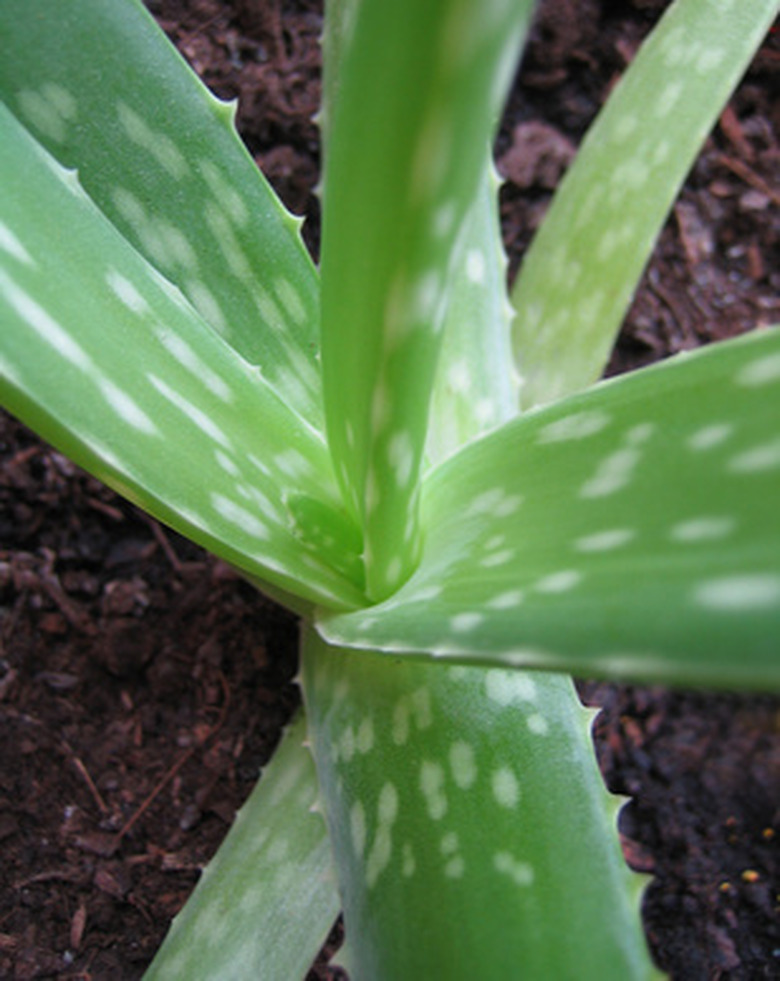Sooty Mold On An Aloe Vera Plant
The aloe vera plant is attractive, useful and easy to care for. With its thick, uplifted arms in a shade of pale green, it tends to attract positive attention. But some homeowners find their beautiful aloe plants beginning to develop an ugly black fuzz. Even if they wipe it away, it comes back heavier than before. Sooty mold is the problem, and it is related to insect infestation on your aloe plant.
Cause
Sooty mold develops as a secondary infection caused by the presence of certain insect pests that produce honeydew, a sticky, sweet substance that adheres to the plant's leaves. Aloe vera plants are susceptible to the aloe vera aphid. As the aphid sucks sap from the aloe plant, it excretes honeydew. Resulting sooty mold infections can be extension, according to the Florida Division of Plant Industry.
- The aloe vera plant is attractive, useful and easy to care for.
- Sooty mold is the problem, and it is related to insect infestation on your aloe plant.
Effects
Like the name suggests, sooty mold resembles a covering of soot upon the plant that may be light or heavy. You can easily scrape off sooty mold with your fingernail, and during dry conditions, it may dry on your aloe plant and dislodge from the plant. Sooty mold itself is rarely harmful, according to the University of Wisconsin Extension, although extensive infections may block access to light and cause the leaves the yellow. If you observe it on your aloe plant, your concern should focus on the insect pest causing the problem and what you can do to treat it.
Aphid Damage
The aloe vera aphid that causes sooty mold, on the other hand, can damage your plant. The bugs feed at the base of aloe leaves or sequester themselves inside of the rolls formed by damaged leaves. Because they extract the nutrient- and water-containing sap that the aloe plant needs to live, they cause the leaves to wither and turn brown.
- Like the name suggests, sooty mold resembles a covering of soot upon the plant that may be light or heavy.
- You can easily scrape off sooty mold with your fingernail, and during dry conditions, it may dry on your aloe plant and dislodge from the plant.
Treatment
Treating sooty mold involves treating the insect problem that causes it. Control aphids on houseplants by rinsing your aloe plant with a strong jet of water to dislodge the insects or crush them by hand when you find them. Sticky traps may capture winged adults. If these control measures don't work, insecticidal soap is one of the most effective remedies against aphids on houseplants, according to the University of Colorado Extension. Always read the label carefully on any product that you use to be sure that it is safe and approved for aloe plants.
Prevention
If you have aphid problems with your aloe plants, check frequently for bugs so that sooty mold doesn't have the chance to develop. The Texas Agricultural Extension Service recommends using sticky traps to monitor aphid populations. Periodically rinsing houseplants also dislodges bugs and removes honeydew, preventing sooty mold buildup.
- Treating sooty mold involves treating the insect problem that causes it.
- Control aphids on houseplants by rinsing your aloe plant with a strong jet of water to dislodge the insects or crush them by hand when you find them.
